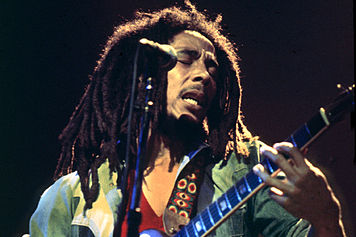
Robert Nesta Marley aka Bob Marley was born on 6 February 1945, in St. Anns, Jamaica. His father was Norval Sinclair Marley, a white marine officer and his mother was Cedella Malcom, an 18-year old black woman.
When Bob Marley was a teenager, his mother moved the family to Kingston, ending up in the shantytown of Trenchtown. Whilst working as a welder, Bob Marley got together with Peter Tosh and Bunny Wailer.
In their early days they were ska orientated. Their first single was Simmer Down (1963). It was a huge hit in Jamaica and dozens of songs followed. Bob Marley married vocalist Rita Anderson in 1966 and spent time with his mother who had gone to the USA. When he returned several months later, the music of the Wailers became much more overtly rasta.
If he had done nothing but record Catch a Fire, Bob Marley would still be known as the person who introduced reggae music to millions of Americans. But more than just a cultural ambassador, Robert Nesta Marley was a fabulously talented songwriter who could mix protest music and undeniable pop as skillfully as Bob Dylan; even before Marley's death at age 36, he was becoming a true culture hero -- the first major rock artist to come out of a Third World country. More than 20 years on, his records sound as fresh as ever, something proved every week by the astonishing continued sales of his greatest-hits package Legend.
The Wailers recorded some of the earliest reggae hits, and with the help of Lee Perry produced songs like Duppy Conqueror and Small Axe. International success came after they joined Island Records. Their first album for Island was Catch a Fire and soon after they supported Bruce Springsteen. Their next album was Burnin' which contained I Shot The Sheriff which was covered by Eric Clapton, as well as Get Up, Stand Up. However, in 1974 Peter Tosh and Bunny Wailer left the group to pursue solo careers. They were replaced by a female vocal trio including Bob Marley's wife Rita.
They then enjoyed huge success with albums like Exodus and Kaya. Bob Marley's religious and political views became increasingly important. He tried to be a force for peace in the midst of Jamaica's turbulent politics. A flavour of Bob Marley's philosophy can be gleaned from the song War from the album Rastaman Vibration: "Until the philosophy which holds one race superior and another inferior is finally and permanently discredited and abandoned, everywhere is war ... and until there are no longer first-class and second-class citizens of any nation, until the colour of a man's skin is of no more significance than the colour of his eyes, me seh war. And until the basic rights are equally guaranteed to all without regard to race, there is war. And until that day, the dream of lasting peace, world citizenship, rule of international morality, will remain but a fleeting illusion to be pursued, but never attained ... now everywhere is war."
I believe the words are based on a speech given to the UN by the Ethiopian emperor, Haile Selassie. Just before the "One Love" peace concert, on 3 December 1976 gunmen broke into the Marley home and shot at the musician, his wife, and others. He was awarded the United Nations Medal of Peace for the concert.
Bob Marley died from cancer on 11 May 1981, in Miami, Florida.

No comments:
Post a Comment